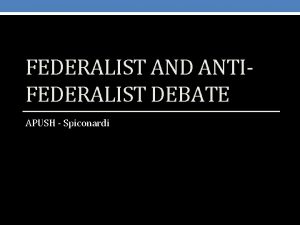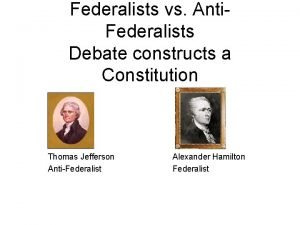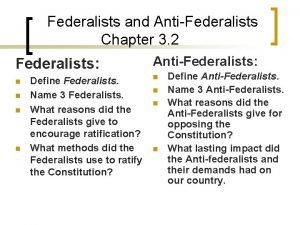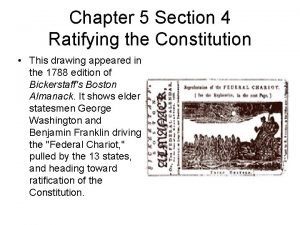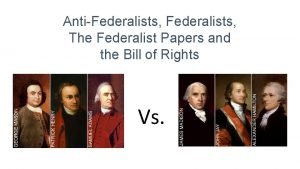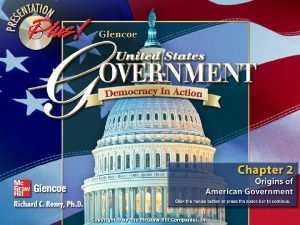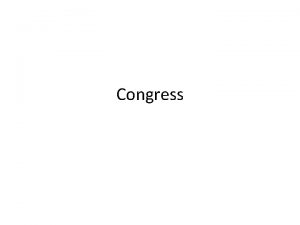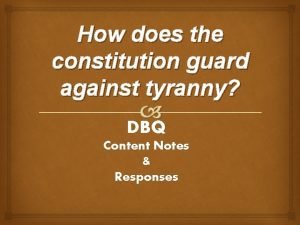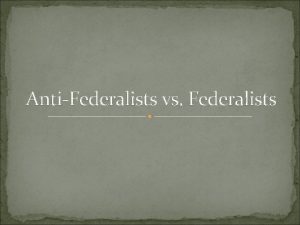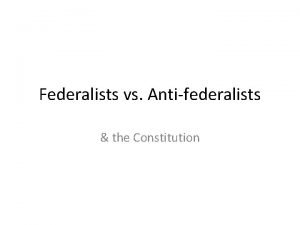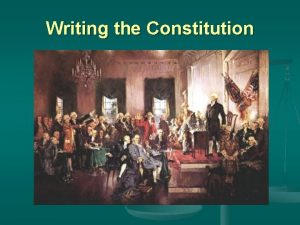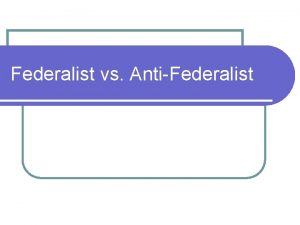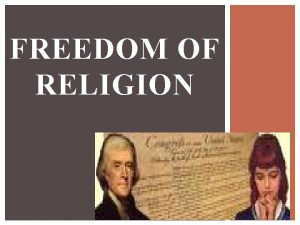AntiFederalists v Federalists Why did the Framers want











- Slides: 11

Anti-Federalists v. Federalists

Why did the Framers want the people to ratify the Constitution? �The Constitution was far from perfect – the entire four months that the Framers spent creating it were filled with disagreements �A few delegates walked out of the meeting, other refused to sign the document �James Madison was worried that the Constitution would be rejected if Congress or state legislatures were asked to ratify it �Ratify = approve

Why did the Framers want the people to ratify the Constitution? �Because the people were going to be asked to follow the Constitution, they needed to approve it �In order for the Constitution to be accepted, nine states needed to ratify the document �The Framers were afraid that they wouldn’t be able to get all 13 states to ratify the document

The Federalists �Supported the ratification of the Constitution �Asked the states to organize ratifying conventions as quickly as possible �In order to support their view, Alexander Hamilton, James Madison and John Jay wrote a series of articles for a New York Newspaper �Collectively, they were known as The Federalist Papers �The collection remains the most important explanation of the constitutional government ever written

The Anti-Federalists �Opposed the ratification of the Constitution �Leaders included: George Mason, Edmund Randolph and Elbridge Gerry �Attended the convention and refused to sign it �John Hancock, Samuel Adams and Richard Henry Lee – all signed the Declaration – but refused to sign the Constitution

The Anti-Federalists �Most Americans were very suspicious of government �Anti-Federalists were especially suspicious of government in general and a strong national government in particular. �This mistrust was the basis of their opposition to the Constitution �They believed it would be a threat to their natural rights

The Debates �Debates in the states lasted ten months �They were intense and sometimes bitter political struggles �The most intense arguments were about three basic issues: �Whether the Constitution would maintain republican government (for the people) �Whether the national government would have too much power �Whether the Bill of Rights was needed in the Constitution

Does the national government have too much power? Anti Federalists � National govt. has too much power – the states have too little � The army that is raised by the government could go against the people � Supremacy clause – national govt. is superior to states’ laws – it will destroy the states � Too much power to the executive branch � Bottom line: The national government has too much power! Federalists � The Articles had a weak national government and it didn’t work! � The Constitution provides protections for states. Any power not listed in the Constitution will be up to the states. � A strong executive branch is necessary – Congress has checks on the use of power by the executive branch � The executive branch can never become a monarchy � Each branch is separate and balanced – no branch can dominate the others.

Does the Constitution provide for republican government? Anti Federalists �Republican governments have only worked in small communities with similar wealth and values – the country is too large and diverse �Free government requires the active participation – the government is too far away from most people �The government will only be able to rule with military force Federalists �People do not work for the common good – a large republic with powers divided between national and state governments are in the best interest of the people �There are too many limits on the government to create chaos, tyranny �The government is protecting the people – and it will get the respect of the people.

Is the Bill of Rights needed for the Constitution? Anti-Federalists �A bill of rights is necessary to protect people against the power of the national government �There is no mention of freedom of religion, speech, press or assembly �If they aren’t written, the government can violate them Federalists �A bill of rights is not needed �The Constitution is the ultimate protection for people’s rights and the people are the ultimate sovereigns. �The Constitution has limited power �If a bill of rights is included, the people can expect protection only for the rights listed.

Compromise & Ratification �The Federalists agreed to a Bill of Rights in order to get enough support for the Constitution to it would be ratified �They agreed when the first Congress was held, they would draft a Bill of Rights �The Constitution was officially adopted on September 17, 1787 � 40 of the original 55 delegates signed the document
 Federalists vs antifederalists apush
Federalists vs antifederalists apush Anti federalists vs federalists
Anti federalists vs federalists Federalism
Federalism 2 federalists
2 federalists Federalists vs anti federalists definition
Federalists vs anti federalists definition Anti- federalist
Anti- federalist Why did the anti-federalists insist on a bill of rights?
Why did the anti-federalists insist on a bill of rights? Why did the framers create a bicameral legislature
Why did the framers create a bicameral legislature How does the constitution guard against tyranny
How does the constitution guard against tyranny Andreas carlsson bye bye bye
Andreas carlsson bye bye bye Why did isolationist want these laws passed
Why did isolationist want these laws passed Josette dugas war of 1812
Josette dugas war of 1812
